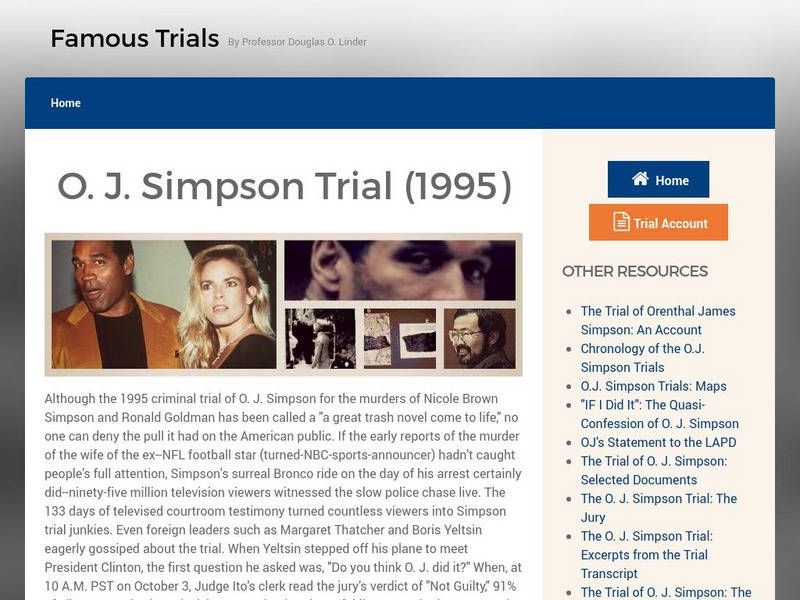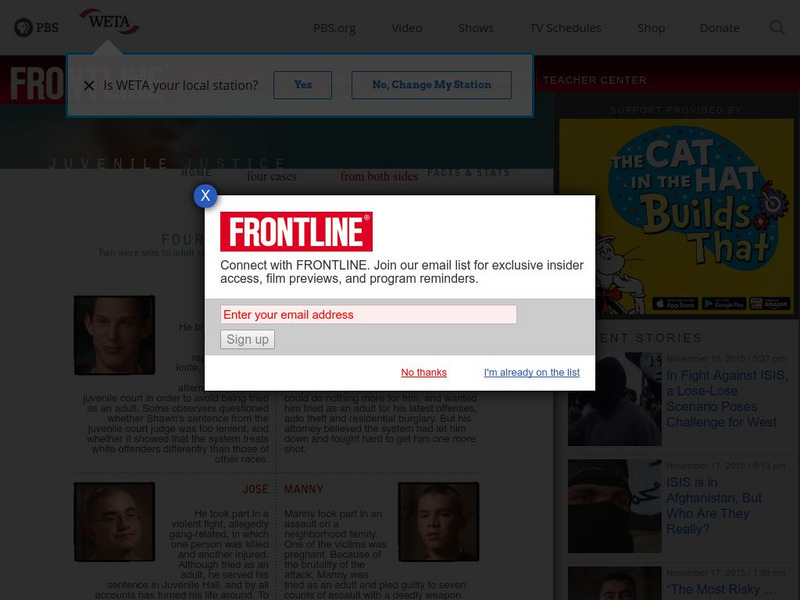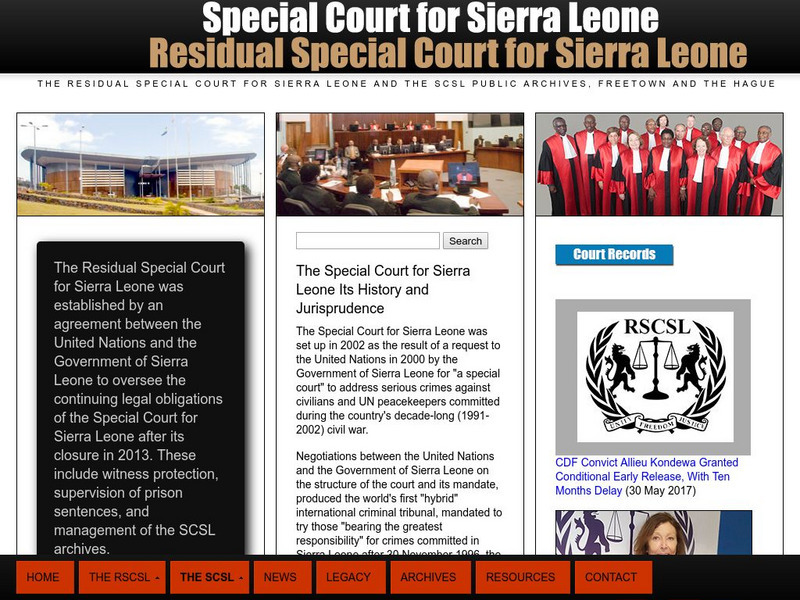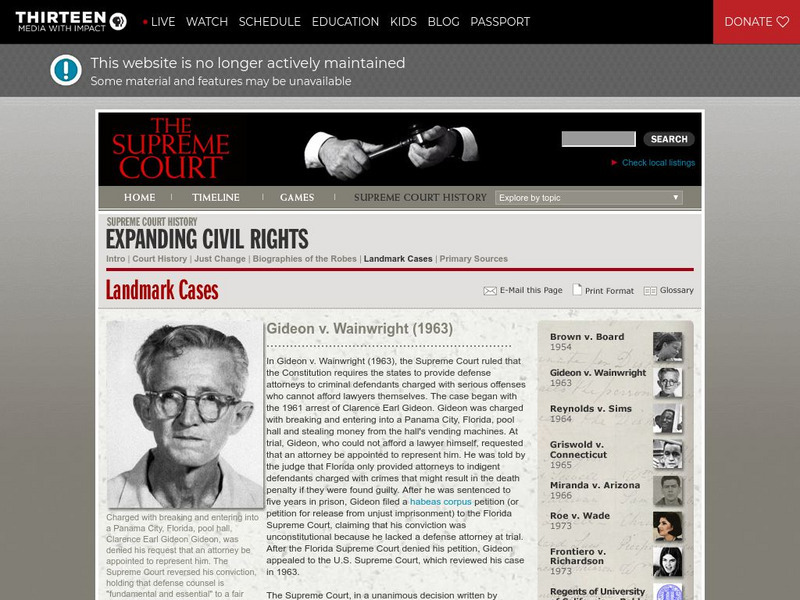Judicial Learning Center
Types of Court Cases
How can one court acquit someone of a crime, while another convicts the person of the same one? It's all because of the differences between civil and criminal trials. An informative resource provides scholars in the field of criminology...
Judicial Learning Center
Why Study Landmark Cases?
Why study landmark Supreme court cases? A helpful lesson offers a brief but valuable argument for the importance of these cases in the field of criminology. It introduces scholars to some key terms necessary for studying court cases and...
Judicial Learning Center
Your 4th Amendment Rights
Americans love to learn about their rights, especially those that protect them from the government's power to invade their privacy. Young people are especially engaged by this topic. An informative lesson explores four Supreme Court...
Judicial Learning Center
Your 1st Amendment Rights
Why should classes care about the First Amendment? An engaging lesson serves as a powerful tool for answering just that. As all four cases in the lesson relate directly to freedom of expression in schools, young scholars explore the...
Judicial Learning Center
Getting Ready for Trial
A courtroom can be a scary place for the uninitiated. Get familiar with the process using a helpful overview of the activities that take place prior to both civil and criminal cases. The lesson explains the differences between...
Judicial Learning Center
Levels of the Federal Courts
The Supreme Court gets all the glory, but very few federal cases make it to the highest court. An interesting lesson explores the structure of the lower levels of the federal court system. In addition to outlining the organization of...
Judicial Learning Center
State Courts vs. Federal Courts
Popular culture often portrays the Feds as the most fearsome of law enforcement agencies. Yet, someone charged with a crime is considerably more likely to end up in a state court. The lesson, one of six covering the Organization of the...
Judicial Learning Center
Judicial Independence
Most people support the idea of an independent judiciary in theory until they hear about a court case that violates their principles. An informative resource explains why the concept is important. It also provides scholars of criminology...
Judicial Learning Center
The Appeal Process
Why doesn't the Supreme Court hear testimony from witnesses? How do they complete an entire proceeding in less than two hours? A helpful lesson guides scholars of criminology through these and other questions by explaining how appeals...
Judicial Learning Center
The Players in the Courtroom
Courtrooms are complicated. In addition to the many rules, there are a number of people whose jobs are not very clear to the casual courtroom observer. With the resource, individuals identify some of these roles and review more...
Judicial Learning Center
Your Day in Court
Whether out of choice or necessity, people want to know what will happen on a typical day in court. A helpful lesson walks scholars in the field of criminology through the trial process from opening statements to the final verdict.
Judicial Learning Center
The Judge and the Jury
Unless you are a lawyer, you might not understand just how unrealistic Law and Order and other legal dramas actually are. Here's a great resource to help scholars of criminology gain a more realistic perspective. The lesson outlines the...
University of Missouri
Famous Trials: The Oj Simpson Trial
This well-researched site offers a comprehensive study of the 1995 criminal trial of OJ Simpson. Includes not only the law and politics involved in the trial, but also the role of the media and the mass public attention placed upon the...
Other
A Short Summary of Criminal Procedures
This site explains the legal actions taken against the Chilean Military under rule of General Pinochet and the Argentinian Military for kidnapping, torture, murder, and genocide. There are also links to actual information on the cases.
PBS
Pbs: Frontline: Juvenile Justice
Read case profiles of several juvenile criminals, many who have been tried as adults. Includes personal background information on each individual, and a discussion of their sentencing.
University of New Brunswick (Canada)
University of New Brunswick: Crime and Punishment in New Brunswick
Two university professors in New Brunswick have created this web site that explores several historic crimes in New Brunswick and how the justice system handled the cases.
Other
Special Court for Sierra Leone
The Special Court of Sierra Leone was set up jointly by the government of Sierra Leone and the United Nations in 2002. Its mandate is to try those accused of war crimes committed in Sierra Leone since 30 November 1996. Read about how the...
BBC
Bbc News: South Africa President Steps Down
Thabo Mbeki announces he is resigning as the President of South Africa, amidst controversy about his role in the criminal case against his rival, Jacob Zuma. Zuma was later elected as President. [21 September 2008]
Harvard University
Harvard Law School: Thirteen Nuremberg Trials
The website currently provides information on the documents used in Case 1, 2, and 4 of the Nazi war crimes Nuremberg Trials.
Other
Innocence Project
Information on cases that have resulted in exoneration of innocent individuals convicted of crimes. Updated daily.
Thomson Reuters
Find Law: Legal Blog Network
This resource provides a network of legal blogs on every type of law and provides the latest news about court cases including the U.S. Supreme Court.
University of Missouri
Famous Trials: The Mississippi Burning Trial
Updated detailed account of the case of United States versus Cecil Price et al., also known as the "Mississippi Burning trial", a criminal trial where the United States charged a group of 18 men with conspiring in a Ku Klux Klan plot to...
PBS
Wnet: Thirteen: Supreme Court: Expanding Our Civil Rights: Gideon v. Wainwright
This is a synopsis of the landmark Supreme Court case of Gideon v. Wainwright, which ruled that states must provide defense attorneys to any indigent criminal defendant charged with a felony. The decision was written by Justice Hugo Black.
Other
Canadian Legal Fa Qs: Charter of Rights and Freedoms Fa Qs
By answering some important questions about the role of the Charter of Rights and Freedoms in the court system, this resource gives insight to the multiple ways the Charter impacts Canadians and the role the Supreme Court has in...
Other popular searches
- Famous Criminal Cases
- Civil and Criminal Cases
- Criminal Cases Research
- Researching Criminal Cases
- Lawyers Criminal Cases




















